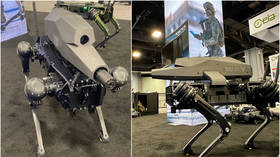Biden administration refuses to ban killer robots
US President Joe Biden has refused to sign a binding international agreement tightly regulating the use of “killer robots.” Campaigners fear such devices will launch an unstoppable arms race toward “digital dehumanization.”
The US prefers a “non-binding code of conduct” regarding Lethal Autonomous Weapons Systems (LAWS, aka killer robots), State Department official Joshua Dorosin said at a meeting in Geneva on Thursday.
His insistence on leaving the Pentagon’s hands free to produce autonomous killer robots stands in line with years of US policy, which has long opposed a global moratorium on LAWS, denouncing the use of a “legally-binding instrument” to halt the development of autonomous death bots.
LAWS have already been deployed during war to track and kill without human involvement. However, other countries have indicated they are willing to renounce autonomous weapons systems. New Zealand declared on Tuesday that it would join an international coalition to ban the systems, arguing that “the prospect of a future where the decision to take a human life is delegated to machines is abhorrent.”
New Zealand Minister of Disarmament and Arms Control Phil Twyford applauded his country’s decision to make the move. Meanwhile, Institute for Ethics in AI Director John Tasioulas found the Biden administration's refusal to budge from its embrace of the killer technology “sad but unsurprising.”
“The emergence of autonomous weapons systems and the prospect of losing meaningful human control over the use of force are grave threats that demand urgent action,” a report by Human Rights Watch and the Harvard Law School International Human Rights Clinic released ahead of the UN meeting declared.
It would be difficult if not impossible to select and engage targets without meaningful human control on a battlefield dominated by autonomous robots, Human Rights Watch Senior Arms Researcher Bonnie Docherty warned, citing instinctive human opposition to “the idea of machines making life-or-death decisions” – particularly the inability to discern between combatants and civilians.
Fears of killer robots have intensified as countries adopt advanced robotics technology, from Boston Dynamics’ four-legged dog bots – beloved by police departments and feared by the citizens whose streets they share – to full-on artificial intelligence.
Facial recognition has also run up against public outcry, with some cities opting to ban it altogether, while companies like Amazon reach out to authorities in an effort to be the first to market the terrifying tech.
The bots have been used on the battlefield, reportedly in terrorist incidents in the Middle East and by the Australian military, among others.
While entities deploying such systems may keep them quiet to avoid spooking the populace, human rights groups like Amnesty International have sought to raise their profile with grisly public awareness campaigns such as a recent contest’ to see if a 'target’ could avoid being detected by a killer AI in 10 seconds.
















